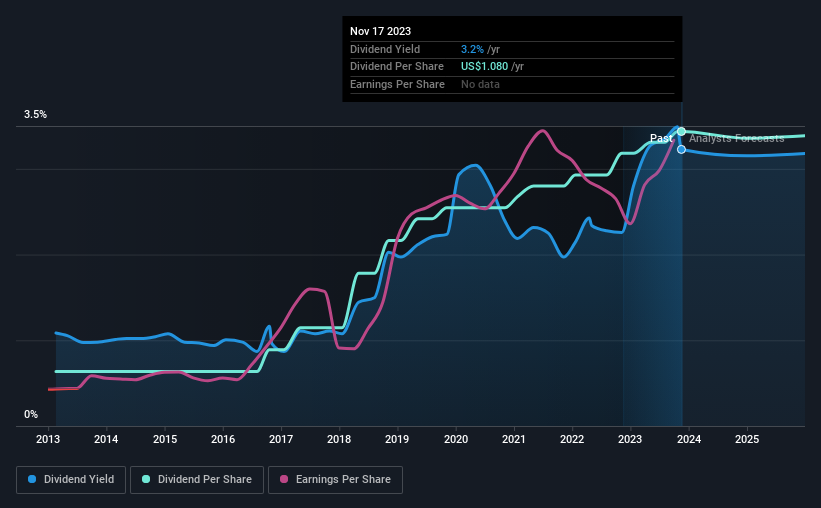Is It Smart To Buy National Bank Holdings Corporation (NYSE:NBHC) Before It Goes Ex-Dividend?
Regular readers will know that we love our dividends at Simply Wall St, which is why it's exciting to see National Bank Holdings Corporation (NYSE:NBHC) is about to trade ex-dividend in the next 4 days. The ex-dividend date is one business day before the record date, which is the cut-off date for shareholders to be present on the company's books to be eligible for a dividend payment. The ex-dividend date is of consequence because whenever a stock is bought or sold, the trade takes at least two business day to settle. Meaning, you will need to purchase National Bank Holdings' shares before the 22nd of November to receive the dividend, which will be paid on the 15th of December.
The company's upcoming dividend is US$0.27 a share, following on from the last 12 months, when the company distributed a total of US$1.08 per share to shareholders. Based on the last year's worth of payments, National Bank Holdings has a trailing yield of 3.2% on the current stock price of $33.47. Dividends are an important source of income to many shareholders, but the health of the business is crucial to maintaining those dividends. That's why we should always check whether the dividend payments appear sustainable, and if the company is growing.
See our latest analysis for National Bank Holdings
If a company pays out more in dividends than it earned, then the dividend might become unsustainable - hardly an ideal situation. Fortunately National Bank Holdings's payout ratio is modest, at just 31% of profit.
Generally speaking, the lower a company's payout ratios, the more resilient its dividend usually is.
Click here to see the company's payout ratio, plus analyst estimates of its future dividends.
Have Earnings And Dividends Been Growing?
Stocks in companies that generate sustainable earnings growth often make the best dividend prospects, as it is easier to lift the dividend when earnings are rising. If earnings decline and the company is forced to cut its dividend, investors could watch the value of their investment go up in smoke. It's encouraging to see National Bank Holdings has grown its earnings rapidly, up 44% a year for the past five years.
Many investors will assess a company's dividend performance by evaluating how much the dividend payments have changed over time. National Bank Holdings has delivered 18% dividend growth per year on average over the past 10 years. It's exciting to see that both earnings and dividends per share have grown rapidly over the past few years.
To Sum It Up
Has National Bank Holdings got what it takes to maintain its dividend payments? Companies like National Bank Holdings that are growing rapidly and paying out a low fraction of earnings, are usually reinvesting heavily in their business. This strategy can add significant value to shareholders over the long term - as long as it's done without issuing too many new shares. In summary, National Bank Holdings appears to have some promise as a dividend stock, and we'd suggest taking a closer look at it.
Wondering what the future holds for National Bank Holdings? See what the five analysts we track are forecasting, with this visualisation of its historical and future estimated earnings and cash flow
Generally, we wouldn't recommend just buying the first dividend stock you see. Here's a curated list of interesting stocks that are strong dividend payers.
Have feedback on this article? Concerned about the content? Get in touch with us directly. Alternatively, email editorial-team (at) simplywallst.com.
This article by Simply Wall St is general in nature. We provide commentary based on historical data and analyst forecasts only using an unbiased methodology and our articles are not intended to be financial advice. It does not constitute a recommendation to buy or sell any stock, and does not take account of your objectives, or your financial situation. We aim to bring you long-term focused analysis driven by fundamental data. Note that our analysis may not factor in the latest price-sensitive company announcements or qualitative material. Simply Wall St has no position in any stocks mentioned.

